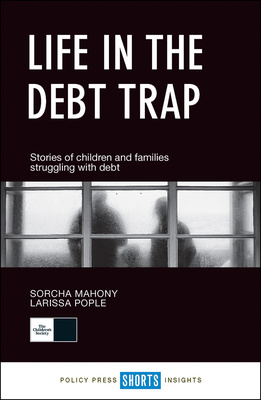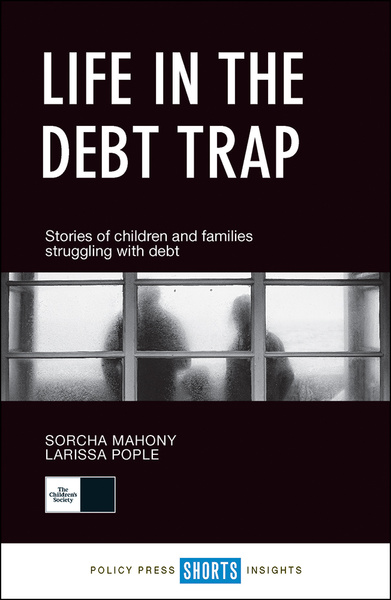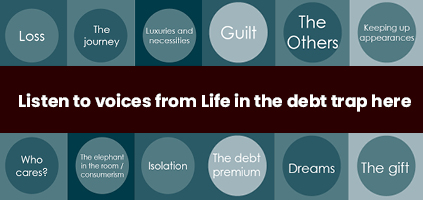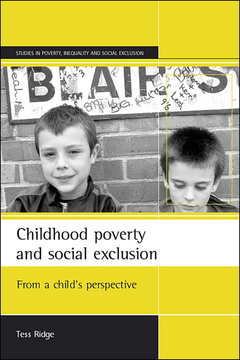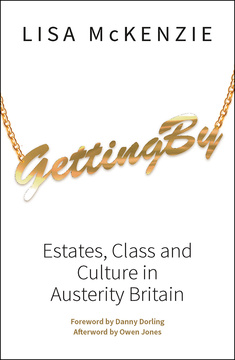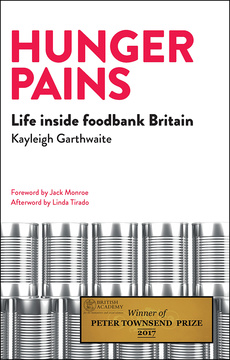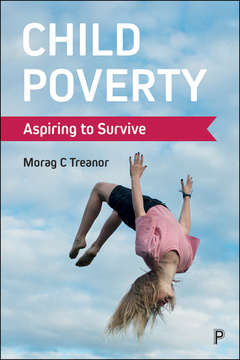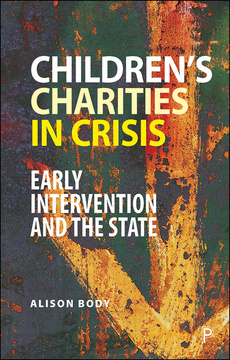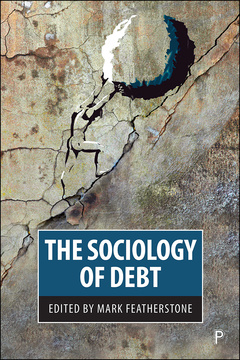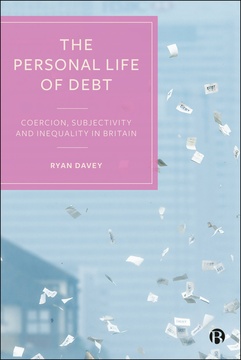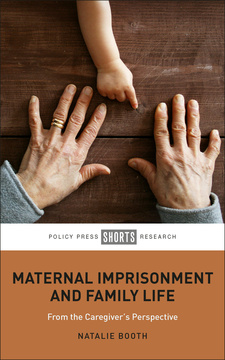Life in the Debt Trap
Stories of Children and Families Struggling with Debt
By Sorcha Mahony and Larissa Pople
Published
May 23, 2018Page count
136 pagesISBN
978-1447341093Dimensions
198 x 129 mmImprint
Policy PressPublished
May 23, 2018Page count
136 pagesISBN
978-1447341109Imprint
Policy PressPublished
May 23, 2018Page count
136 pagesISBN
978-1447341116Imprint
Policy PressIn the media
On our blog: “I just don’t like moving all the time”: Growing up with housing insecurity in England
On our blog: PODCAST: Isolation and life in the debt trap
On our blog: PODCAST: Loss, grief and life in the debt trap
On our blog: PODCAST: Dreams and life in the debt trap
What is life like for families who are stuck in problem debt? Why do they fall into a spiral of debt in the first place, and why is it so hard to escape?
The first hand stories in this book offer a unique understanding of life for families and children fighting a daily battle against poverty and debt. They give voice to some of the most underrepresented people in society, who are too often portrayed cruelly in the media and elsewhere.
Drawing on research data collected through The Children’s Society’s Debt Trap campaign, this book explores the causes, implications and impacts of problem debt, challenges pejorative public attitudes and encourages more compassionate policy making to help families escape poverty and debt.
"Life in the Debt Trap is required reading on our BA Social Sciences. As well as using it to teach students about the impact of problem debt on children and families, we use it to stimulate reflection on how best to present our research findings when we want to persuade policymakers of the need for action on pressing social issues. We consider the book to be exemplary in this respect. We also use it to illustrate the value of taking seriously young people’s perspectives on issues that affect them." Sharon Gewirtz, Centre for Public Policy Research, King’s College London
"Life in the debt trap is essential reading for anyone trying to understand the reality of people’s lives when they are struggling with debt. We have used it internally to bring to life the difficulties that many of our customers will experience every day as it is more insightful than any text book could ever be. When I finished reading it, I really cared about the people that I’d “met” and wanted to know what happened to them afterwards. I have recommended the book to many people and will continue to do so." Siobhan O’Loughlin, N Power
I have used The Debt Trap in a number of ways:
• encouraging MA students on our module on child poverty to read it to get a sense of the issues of debt and poverty in relation to children’s lives;
• encouraging dissertation students at MA and BA level to use it both for the subject matter and for the insights into doing research in the real world, and the kinds of ethical and methodological issues that might arise;
• using it with BA students to bring to life some of the issues around child poverty in a less academic way, given the real insights into people’s lives that are possible through the story telling approach.
I also highlight it often in conference presentations, especially in relation to the story about the girl who took so much pride in helping her mum to manage. It’s such an effective way of highlighting children’s agency in the context of poverty, and the complex way in which the different rights that children have can interact and come into conflict with each other.
“A powerful and compelling account of family life in the context of problem debt. Required reading for people studying, working with, and most importantly making policies affecting low-income families.“ Gill Main, University of Leeds
“This beautifully written, perceptive and reflexive study of debt is a testament to the power of stories, grounded in wider research and policy contexts. Please read it.” Professor the Baroness Ruth Lister of Burtersett
Sorcha Mahony is a senior researcher at The Children’s Society and leads a unique research programme on the experiences of young people growing up in poverty.
Larissa Pople is a senior researcher at The Children’s Society where she leads the charity’s groundbreaking children’s wellbeing research programme.
The Children’s Society is a national charity that works with the most vulnerable children and young people in Britain today. We listen. We support. We act. Because no child should feel alone. www.childrenssociety.org.uk
Preface: The origins of the book
Introduction and methodological note
The journey
Isolation
Loss
Luxuries and necessities
Who cares?
The elephant in the room/consumerism
Guilt
The Others
Keeping up appearances
The child
The tyranny of the small things
Juggling
The downside of help
The debt premium
Dreams
The gift
Our participants
Concluding reflections







